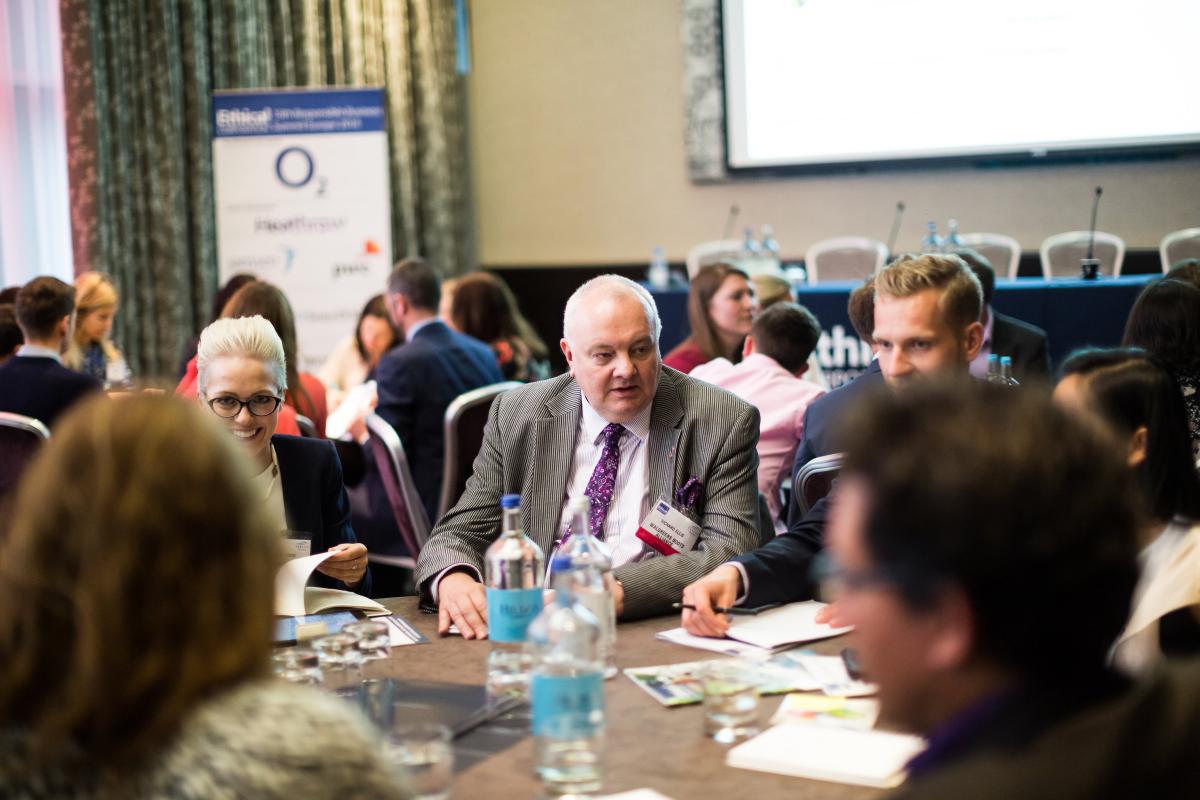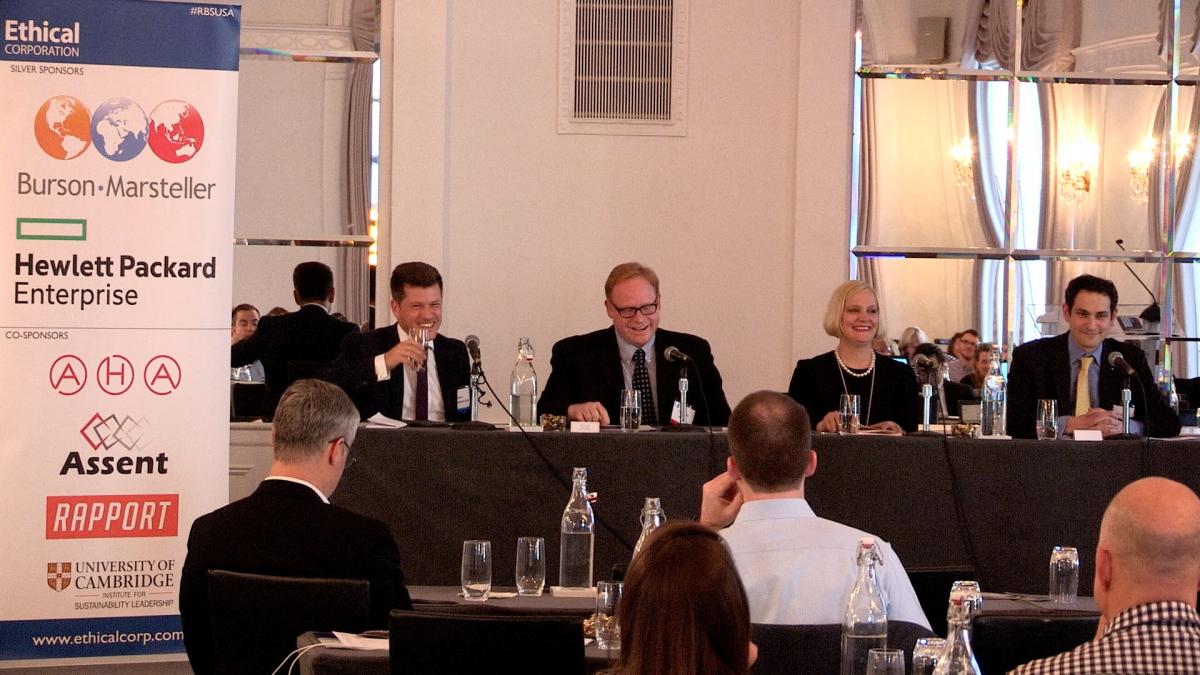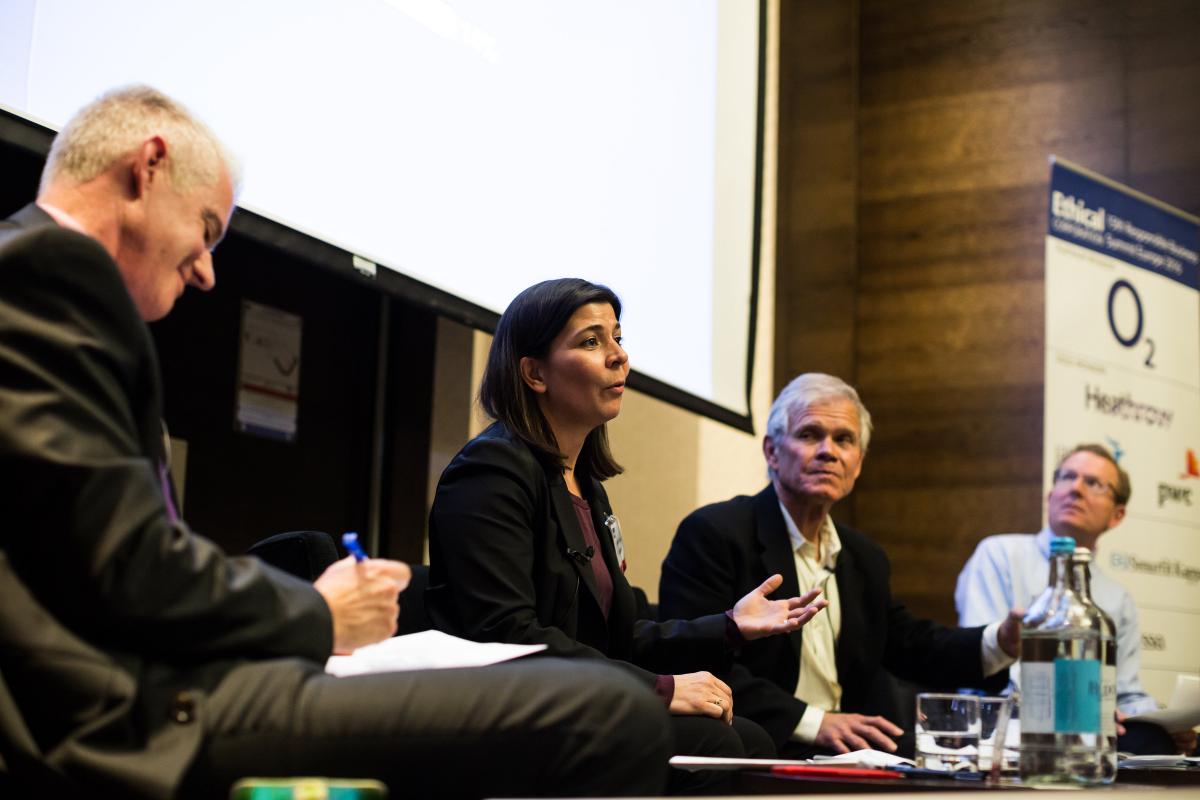Liam Dowd sums up the takeaways from Ethical Corporation’s Responsible Business Summits in London, New York and Singapore
For the first time in Ethical Corporation’s history, we took our Responsible Business Summit series to three separate continents, with the events - in New York, Singapore, and finally, London - taking place over the course of three months.
Throughout these three summits we hosted more than 100 expert speakers and 700 delegates from a broad spectrum of global brands, consultants and service providers, NGOs and government agencies, and leading academics from the field of corporate responsibility.
They were treated to a wealth of lessons and case studies about how business is facing up to the key global sustainability challenges of today. These range from climate change and environmental degradation, to social inequality and human rights, and are all encapsulated by the parameters of the sustainable development goals (SDGs).
Our global events also crucially demonstrated that businesses no longer consider these efforts as a sideshow to maximising profit. Instead, businesses of all shapes and sizes – from the innovative and nimble start-ups to the Timberlands and Telefonicas of this world – are putting this social and environmental purpose at the very core of their business strategy, and are delivering a positive impact to a wide range of stakeholders.

They are also increasingly able to demonstrate that putting responsibility and sustainability at the heart of their business makes great business sense. The former CEO of Telefonica UK O2, Ronan Dunne, expressed his belief that “businesses that do good as part of their business strategy ultimately do better, and businesses that do better survive longer.” While Bloomberg’s head of sustainable business programmes, Lee Ballin, referred to a saying often used within his team that corporate social responsibility should really be called corporate social opportunity.
Eileen Howard Boone, senior vice president for corporate social responsibility and philanthropy at CVS Health, explained that purpose was a key factor in the company dropping tobacco products from its stores, in spite of the prospect of losing out on as much as $2bn in sales per year. Meanwhile Craig Kreeger, CEO of Virgin Atlantic Airways, argued that customers now expect major brands to be making progress on sustainability, adding: “I like to think that our customers know we’re going to have their back; if they’re committed to being a better global citizen, they can trust us to do the same thing.”
Putting responsibility first
According to Marks & Spencer’s director of Plan A, Mike Barry, it’s important to build capacity and skills across the organisation to deal with issues that would previously have been the sole remit of the sustainability department. In a virtuous circle, a strong and demonstrable commitment to responsible business will help a company to attract and retain the best talent, especially as more millennials enter the workforce. Dunne argued: “If you can attract and retain the best talent, and align that talent to purpose, then you have the key ingredients to a successful business.”
As various executives stated across the three events, trust and reputation are essential to earning the social licence to operate. However, in today’s increasingly connected and digitalised world, reputations that take years to build up can be lost in an instant. Paul Drechsler, president of the Confederation of British Industry warned: “It takes a long time to earn trust, and the only way you earn it is through the way you behave.”

Because of this, the behaviour and tone of senior executives is crucial to ensuring that the rest of the business plays ball. However, as Arvind Limited’s executive director, Punit Lalbhai explained, “It’s not enough to have a top-down directive; one needs to have bottom-up champions” in order to drive positive change throughout the organisation.
The top takeaway was that it pays to be honest and open, even if this can be painful and humbling in the short term. Bas van Abel, CEO of Fairphone, a social enterprise company that aims to develop smartphones with minimal harm to people and the planet, claimed that “one of the best things you can do to gain trust is to show your vulnerability as a company”, beginning with the acceptance that the “glossy and shiny” presentation of a product is not the full story. Customers expect companies to be honest about their failings, rather than divert attention to other successes. Patagonia’s vice president of public engagement, Rick Ridgeway, said: “Our definition of transparency with our customers and our stakeholders is to openly tell everybody what we’re doing that is good, and to ‘fess up where we’re falling short and causing harm. That creates trust.”
Engaging with stakeholders
Numerous speakers were keen to emphasise that businesses should cast a wide net when assessing who to engage as their stakeholders. Elizabeth Uhlhorn, sustainability project manager at the Dow Chemical Company, said that Dow has made nature a stakeholder, while The Nature Conservancy’s Ben Packard added that children should be seen as one of the most important stakeholder groups, considering that one of the top motivations for pursuing sustainability is to leave behind a better society and planet for the next generation.
When it comes to engaging with stakeholders on sustainability, Interface’s president and CEO for Asia Pacific, Rob Coombs, posed the question: “How do you get inspired by a negative message?” ICTI CARE’s CEO, Carmel Giblin, warned that there was an urgent need to make sustainability more appealing and accessible to a wider audience.
Neill Duffy, chairman of the Super Bowl 50 Host Committee, based in San Francisco, gave a fantastic case study on using a major sporting and cultural event to get as many stakeholders as possible to engage in key sustainability initiatives and become ‘ambassadors’. “People want to be engaged in sustainability, and they want to have an opportunity,” Duffy explained. “You just need to make it easy for them”. Businesses will not address global sustainability challenges by simply lecturing consumers on the merits and necessities of living more sustainably.
Betsy Henning, CEO and Founder of AHA, stressed that sustainability communications should be written as if for an audience of 13-year-olds. This is because they will make it very clear if they are bored, Henning argued. “They will give you very accurate and honest cues about your story.”
Unilever’s Sarah McDonald noted that although a 2015 study by Nielsen found that 66% of consumers are willing to pay more for sustainable productstoo oftenthis doesn’t translate into action..

If a business is stuck on how it can encourage more responsible behaviour, it should consider its own marketing department. Several speakers, including Lucy Carver, director of Sky’s Bigger Picture sustainability programme, stated that sustainability folk also need to think like marketeers in order to fulfil their roles as change agents and communicators.
Competitive collaboration
The SDGs are an all-encompassing blueprint for global development, but addressing them and other sustainability challenges will be impossible without multi-sector collaboration. Chris Librie observed: “No one person, company, organisation, or government can solve all the world’s problems alone; but together we can create transformative solutions that radically accelerate human, economic and environmental progress to the benefit of all.”
Businesses should be prepared to establish partnerships with other organisations, including their own competitors. Tim Mohin used the term “collaboretition” to describe the concept of competitive collaboration, where different businesses work together on a given sustainability challenge, before one decides to break rank and “go above and beyond and lead on that issue”. There are many examples of such successful industry-wide coalitions, such as the Sustainable Apparel Coalition and the Electronic Industry Citizenship Coalition.

However, collaboration should always be about driving positive change. As Ronan Dunne warned: “Responsible business should be about working with others collaboratively to create an ecosystem in which everybody benefits, rather than simply saying ‘look at me!’”
Collaboration also stretches to a company’s own supply chain, and there was evidence of a welcome shift towards companies working with their suppliers and helping those that are failing to comply with social and environmental standards. HP Inc, BT, and AkzoNobel were among those that shared insights as to how they are doing this and ICTI CARE’s Carmel Giblin stressed that auditing suppliers on their social and environmental responsibility performance “is absolutely pointless unless you’re going to do something with the results of the audit.”.
The importance of treating suppliers as equal partners should not be underestimated. Jeremy Rowe, managing director of decorative paints at AkzoNobel, said: "Our largest footprint is with our suppliers, so how we use and work with them is of critical importance."
Looking to the future
The rise of big data, AI, and the digital economy are transforming the business landscape, and offering both opportunities and risks. Dunne of Telefonica spoke about these implications, but commented that while we are seeing “the front of the digital revolution” we have yet to embrace “the fundamental, societal and behavioural change that will be driven by it”. Furthermore, he warned that: “the early implications of going digital in most businesses has been to simply digitise an analogue activity. That’s simply not a digital revolution.”
City Development Limited’s Esther An underlined the importance of innovation, stating that if a company is unable to meet the rising demand, “you risk losing customers, and if you lose customers, you lose your competitive edge.”
One of the best demonstrations of leveraging innovative new technologies to meet key sustainability challenges is through the circular economy. There were several noteworthy examples this, from start-up Kusaga Athletic, whose CEO, Graham Ross, highlighted the importance of “an open and collaborative approach”, to HP Inc. Its CSR director, Kirstie McIntyre, explained that HP is using the circular economy to create new business models that help manage supply chain risks, such as its Instant Ink printer cartridge subscription service.

Finally, across the three events there was plenty of discussion around the legacy of the two landmark sustainability events of 2015: the signing of the new set of Sustainable Development Goals, and the historic COP21 climate summit that resulted in the Paris agreement.
Valerie Smith, director of corporate sustainability at Citi, argued that the SDGs represent a chance for businesses to examine how their sustainability priorities align with the new goals, as well as build new partnerships. “Creating spaces to bring together different parties that aren’t used to problem-solving together could end up being one of the most important legacies of the SDGs,” she said.
However, Samantha Putt Del Pino, director of sustainable business initiatives at the World Resources Institute, emphasised that this opportunity for companies to reframe their approach calls for more than just business as usual. “If in 15 years’ time all we are able to say is that companies have taken what they were doing anyway and mapped it to the SDGs, then we won’t have made enough progress,” she argued.
PwC’s Malcolm Preston gave a detailed presentation on the business case for getting on board with the SDGs, and added that “the tools are being developed that allow companies to start engaging on this subject and deal with some of its complexity”. He also suggested that businesses should count government as a key stakeholder in their work on the SDGs, saying: “Those companies that understand whether they are helping or hindering a government achieve its goals, and therefore know where the regulation’s likely to come, will be ahead of the curve and get competitive advantage.”

While 2015 delivered two promising results for the CSR profession, 2016 could be said to have delivered two negative results in the shape of the Brexit referendum and Trump election. Next year may start with more uncertainty than 2016, but one thing is for certain: businesses can and should be the driving force to ensure the work towards the SDGs and Paris agreement increases in momentum. As we learned from the speakers at our conferences this year, a responsible strategy that delivers purpose and impact will not only improve society and the environment, it will also help create a competitive edge and drive more business.
business strategy #RBSEU Responsible Business Summit Telefonica PwC Interface
